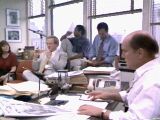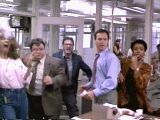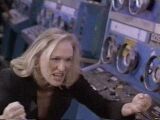The Paper
1994 US
Dir: Ron Howard
Str: Michael Keaton, Glenn Close, Robert Duvall, Marisa Tomei



I watched The Paper on an airplain. I'm really ashamed of the fact
that was my first trip to any foreign country.
The Paper is one of my most favorite movies of recent years. Besides
the quality of the movie itself, there is another personal reason why I am attracted to it. That is, The Paper
is the movie I watched on an airplain bound for Canada, and I am really ashamed to confess that it was my first
trip to any foreign country despite the fact I was almost 35 years old at that time. So I had a great expectation
of being abroad while I was watching this film. As is often the case with movies or music, this kind of emotion
can be easily combined with background occurrences accompanying it no matter how peripheral they seem to be, and
the substance (in this case, this film) to which the emotion in question has been attached surely gains some special
meanings.
Why are they always bringing fire weaponry into movies?
As this movie was made in 1994, you might think it could not be called a recent
movie. But, these years, it is very difficult to find an engrossing movie like this one at least for me, and so
much so that I must include 1994 in the category of recent years. Especially heavy reliance on hardware aspects
of recent movies seems to have been diluting the contents of movies. And I also seriously suspect that such kind
of notion as all movies must have at least one dramatic scene has been haunting the mind of movie makers, and,
as a result, movies, against their original intention, has been all the more becoming pointless and tepid. Of course,
The Paper is not totally immune from those illness, for there are several sequences which seem to be extraneous
to the course of the story, and just put into the place merely for aiming dramatic effect. For example, one of
the newspaper men (played by Randy Quaid) is chased after by a guy whom he accused on the paper, and eventually
he is ferreted out in a bar, where the guy shoots the gun that has conveniently slipped out of the newspaper man's
pocket, and the bullet discharged quite accidentally hit the leg of another female staff of the newspaper firm
(played by Glenn Close). I guess this scene might have been inserted in order to prepare for the later scene where
it is emphasized how firmly she understand Michael Keaton's intention of never issuing wrong articles. In this
later scene, she persistently claims to make a phone call in spite of her serious wound caused by being shot to
talk the printing section out of issuing the papers containing a wrong article. But, if so, there must have been
dozens of other ways to show it without any use of fire weaponry. There is no inevitability whatsoever she should
be shot. When I watch foreign movies, I sometimes wonder why they cannot dispense with bringing guns into movies.
I'm not quite sure that the reason why I think so is because I am living in Japan where the possession of fire
weaponry is strictly prohibited for usual persons. But, anyway, I consider bringing up a gun into this genre of
movies is totally unnecessary and has no inevitability, and could even completely ruin the plausibility of the
drama in question.
Michael Keaton is a spinning top by whose centrifugal force his life
is barely sustained.
Anyway, the complaint described in previous section is very minor, and overall
quality is not ruined by these flaws, which is not the usual case with other movies. Because the focal point of
this film is very clear. I think The Paper has succeeded in illustrating the urge of modern lives very vividly.
The urge to accomplish everything in haste. Especially those rackets related to mass media that is depicted in
the film is likely to become so. They even seem to me to be belonging to another dimension. For example, the chief
staff of the newspaper firm (played by Michael Keaton) suddenly loses his equilibrium and becomes dizzy the moment
he goes back to normal life in a restaurant. Because his entire life is barely poised on his quickly passing everyday
life. In other words, he is a spinning top by whose centrifugal force his life is barely sustained. So once the
spinning movement stops, it also means his existance itself shall be endangered. And the section head of the firm
(played by Robert Duvall) even look up the meaning of the word "deadline" in a very thick dictionary
to insinuate the fact no one cares about observing it. This episode obviously tells us the fact they are always
being chased by time.
How about you? Aren't you always feeling an urge inexplicably
arising from deep down in your system?
And, of course, these aspects are not limited to only those who belong to mass
media business. More or less, all people seem to have suffered from this inescapable modern disease. In short,
we cannot grab and hold time, which is the most essential aspect of human life according to the eminent philosophers
like Heidegger. It is always slipping away out of our palms. Nevertheless, we usually manage to overcome it by
deceitfully forcing ourselves to put into the position where there seems to be no such problem in the first place.
For instance, in the case of Michael Keaton, the effort to retain trueness in his story seems to keep him from
crumbling down into total dissolution of his integrity. So, for him, wrong story have to be replaced with right
one. There is no room for being wrong, for being constantly right keeps him afloat on the surface of uproarious
sea of ever-altering modern lives. Of course, real intention of this scene might be to show us his moral and consistency,
and of course I'm not suggesting correcting one's own mistake is a laughing matter. But his behavior itself is
apparently extraordinarily out of proportion. And, one more scene; his wife (played by Marisa Tomei) tells him
she has forgotten all of those claps happening in the racket after bearing her child. Probably this means she got
another object she can get a grip on; that is, a baby.





